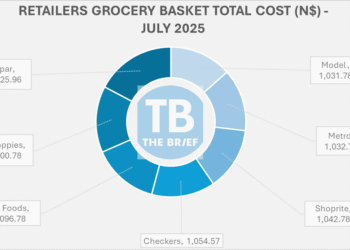
Namibia’s mining sector last year spent N$15.3 billion on goods and services acquired from local companies, the Chamber of Mines of Namibia has said.
This was after direct employment in the mining industry increased by 4.5% in 2021, with 15,246 people collectively employed in the sector. Latest figures show that the direct employment consisted of 8,640 permanent employees, 1,103 temporary employees and 5,503 contractors.
“The increase in employment was a result of the various expansion activities carried out by mining companies including Rosh Pinah Zinc, Namdeb, Navachab, B2Gold and Debmarine Namibia, and increased exploration activity. Applying a conservative mining multiplier of 7, the mining industry created 106,722 jobs, which is a sizable portion of Namibia’s workforce,†Chamber of Mines of Namibia President, Hilifa Mbako said.
Of the jobs in the country’s mining sector, 96% were held by Namibians according to the Chamber President with a total wage bill of N$5.945 billion paid during the period under review.
“Every job created by the industry also generates an important source of revenue for the Government through PAYE and VAT as a consumption tax. In 2021, employees from mining companies paid N$1.086 billion in PAYE. According to the annual remuneration survey carried out by PWC RemChannel, local Namibians benefitted from much higher salaries and more attractive benefits paid by the mining sector compared to other sectors,†he said.Â
He added that the mining sector continued to uphold its commitment in supporting local suppliers, and spent approximately N$15.297 billion on goods and services from Namibian registered businesses.
“This is equivalent to 47 % of total industry revenue from mining in 2021. As a proportion of total procurement spend by the sector, the local spend amounts to 59%,†Mbako said.
The sector paid N$1.553 billion in corporate taxes last year, a decline from N$2.2027 billion paid in 2020, a position attributed to lower profits recorded.
“Chamber of Mines of Namibia members collectively paid N$1.611 billion in royalties and N$231.7 million in export levies in 2021, a 3.65% and 0.57% decline respectively. The drop in royalties was a result of the royalty remission from 10% to 5% to Namdeb land-based diamond mining operations,†Mbako said.
Total capital investment reported by Chamber members according to Mbako, posted an increase of 15.3% of Gross Fixed Capital Formation in 2021, totalling N$5.592 billion.
“Investment was driven by the construction of Debmarine’s new mining vessel, the Benguela Gem, along with expansion projects at the Otjikoto gold mine, Rosh Pinah mine and Navachab. Figures from the Bank of Namibia show that the mining sector has collectively invested N$14.1 billion over the last three years, a sure indication that the industry is also a major source and contributor of direct investment into Namibia, whereas other sectors have registered declining levels in recent years,†he said.
According to the Namibia Statistics Agency (NSA) Preliminary National Accounts, the country’s mining sector recorded a 13.6% growth rate attributed to an increase in the production of diamonds and uranium and a moderate increase in gold output.
The uranium and diamond subsector according to NSA data registered growth rates of 2.5% and 25.8% respectively.
Mining also remained the primary sector anchor of the economy and the largest contributor to GDP which amounted to 9.1% in 2021.
Â











